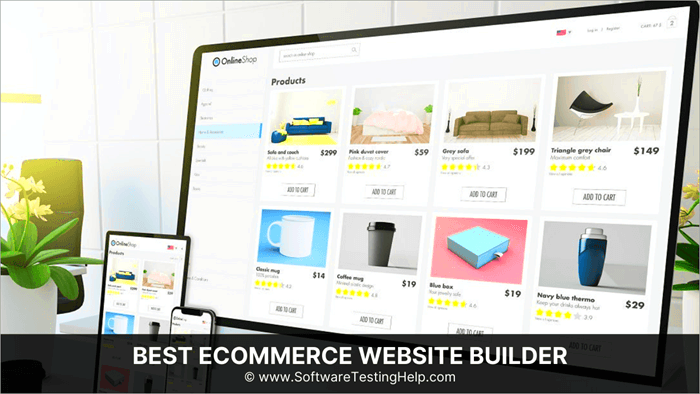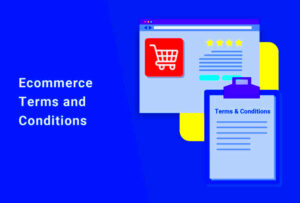In today’s digital landscape, the demand for online shopping is at an all-time high, making eCommerce website builders a vital tool for entrepreneurs and businesses. An eCommerce website builder allows anyone, regardless of technical expertise, to create and manage an online store effortlessly. These platforms offer a range of features tailored to streamline the process of setting up and running an eCommerce site, from customizable templates to robust payment processing solutions. Whether you’re launching a new product line or transitioning from a brick-and-mortar store to an online marketplace, finding the right
Factors to Consider When Choosing an Ecommerce Website Builder

Selecting the perfect eCommerce website builder involves careful consideration of several key factors. Here’s a straightforward breakdown to help guide your decision-making process:
- User-Friendliness: Look for a platform that’s easy to navigate. A simple drag-and-drop interface can save you precious time and frustration.
- Customization Options: Ensure the builder offers customizable templates to fit your brand’s aesthetics. The ability to modify layouts, colors, and fonts is crucial for brand identity.
- Payment Processing: Check for multiple payment gateways and low transaction fees. Customer trust is key, so offering options like PayPal, credit cards, and digital wallets can be a win.
- SEO Features: A good eCommerce builder should come equipped with SEO tools to help you rank in search engines. Look for features like customizable meta tags and URL structures.
- Mobile Responsiveness: In an era of mobile shopping, ensure that your website will look great on smartphones and tablets.
- Customer Support: Reliable customer support can save you a lot of headaches. Opt for platforms that offer 24/7 support through chat, email, or phone.
- Scalability: Choose a builder that can grow with your business. It should handle increased traffic and additional products seamlessly.
Taking these factors into account will help you choose an eCommerce website builder that aligns with your business goals and ensures a smooth online shopping experience for your customers.
Top Ecommerce Website Builders of 2024
As we step into 2024, the landscape of ecommerce continues to evolve, making it crucial for businesses to choose the right platform to build their online presence. With a plethora of options available, selecting a website builder that meets your specific needs can be quite a task. Here, we’re diving into the top ecommerce website builders of 2024, focusing on their unique features, ease of use, and integrations that can help your business thrive.
Whether you’re starting a small business or managing a larger operation, these platforms have something to offer:
- Shopify – Known for its ease of use and extensive app ecosystem.
- WooCommerce – A powerful plugin for WordPress users looking for flexibility.
- BigCommerce – Features a robust set of tools for scaling your online store.
- Wix eCommerce – Offers fantastic design flexibility with an intuitive interface.
- Squarespace – Ideal for creatives who want beautiful templates.
- Magento – A scalable option for large enterprises needing complex solutions.
Each of these builders brings its unique strengths to the table, catering to different business types and goals. In the following sections, we’ll delve deeper into Shopify, one of the most popular and user-friendly platforms out there.
1. Shopify: A Comprehensive Overview
If you’ve dipped your toes into the world of ecommerce, you’ve likely heard of Shopify. This platform has been a game-changer for online retailers, and in 2024, it continues to uphold its reputation as one of the best ecommerce website builders around.
What Makes Shopify Stand Out?
- User-Friendly Interface: The intuitive drag-and-drop builder allows anyone to create an online store without any technical skills.
- Vast App Store: Shopify boasts more than 3,000 apps that enhance its functionality, from marketing tools to inventory management.
- Mobile Optimization: All Shopify themes are mobile-responsive, ensuring your store looks great on any device.
- Security Features: With PCI compliance and SSL certification, Shopify provides a secure shopping experience for customers.
- 24/7 Support: Shopify’s support team is available around the clock through various channels, including live chat and email.
Key Features to Note:
| Feature | Description |
|---|---|
| Customizable Themes | Choose from a variety of professional themes to match your brand. |
| Payment Gateway Options | Supports multiple payment gateways, making checkout easy for customers. |
| SEO-Friendly | Built-in SEO features help your store rank higher on search engines. |
| Analytics Tools | Access detailed analytics to track your store’s performance and customer behavior. |
In summary, Shopify is a robust ecommerce platform that offers a blend of simplicity and scalability. It caters to startups, small businesses, and larger enterprises alike, empowering them to reach their ecommerce goals with ease. If you’re looking to launch your online store in 2024, Shopify is definitely worth considering!
WooCommerce: Benefits and Features
When it comes to building an ecommerce site, WooCommerce stands out as one of the most flexible and feature-rich solutions available. Originally designed as a WordPress plugin, it turns your WordPress site into a fully functional online store. So, if you’re already familiar with WordPress, integrating WooCommerce should feel like a walk in the park!
Benefits of WooCommerce:
- Open-Source Freedom: Being open-source means you can customize your online store as much as you want. This flexibility allows you to tailor your ecommerce site to exactly how you envision it.
- Robust Plugin Ecosystem: With thousands of plugins available, you can extend the functionality of your store easily. Whether you need payment gateway integration or SEO tools, there’s likely a plugin for that!
- SEO Friendly: Built on WordPress, WooCommerce inherits the platform’s SEO advantage. With built-in features and endless optimization possibilities, you can significantly boost your store’s visibility.
- Strong Community Support: Being popular among ecommerce entrepreneurs means you have access to a large community, forums, and extensive documentation to help you tackle any challenges.
Key Features of WooCommerce:
| Feature | Description |
|---|---|
| Product Management | Add, edit, and manage a variety of products, including digital and physical items, with ease. |
| Payment Options | Supports various payment gateways like PayPal, Stripe, and many others for a seamless checkout experience. |
| Mobile Optimization | Responsive design ensures your store looks great on any device, enhancing user experience. |
| Shipping Options | Various shipping methods, including flat rate, free shipping, and international shipping, can be easily configured. |
In summary, WooCommerce is a robust choice for anyone looking to create a customizable online store. It gives you control, versatility, and a wide range of tools to help your ecommerce business thrive!
Wix Ecommerce: User-Friendly Solutions
If you’re on the lookout for an ecommerce website builder that doesn’t require a tech-savvy background, look no further than Wix Ecommerce. Known for its drag-and-drop interface, Wix makes setting up your online store as easy as pie. It caters to everyone, whether you’re a small business owner or an aspiring entrepreneur.
Why Choose Wix Ecommerce?
- Intuitive Design Tools: The easy-to-use visual editor allows you to design your site by simply dragging and dropping elements. You don’t need any coding skills, making it accessible for everyone!
- Beautiful Templates: With a plethora of stylish, pre-designed templates specifically for ecommerce, you can create a stunning storefront that matches your brand’s identity without any hassle.
- All-in-One Solution: Wix offers everything you need under one roof – from hosting and domain registration to payment processing and marketing tools. This means less time managing separate services and more time focusing on your business.
- Integrated Marketing Tools: Wix provides built-in SEO, email marketing, and analytics tools to help you attract and retain customers, enhancing your reach without needing external services.
Key Features of Wix Ecommerce:
| Feature | Description |
|---|---|
| Custom Domains | Create a professional online presence with a custom domain name, reinforcing your brand. |
| Mobile Optimization | All templates are mobile-responsive, ensuring a seamless experience for buyers on any device. |
| Various Payment Options | Supports multiple payment methods, including credit cards, PayPal, and more, providing flexibility for customers. |
| Abandoned Cart Recovery | Automatically send emails to customers who abandon their carts, encouraging them to complete their purchases. |
In essence, Wix Ecommerce is perfect for those who want to build an online store quickly and with minimal fuss. Its user-friendly approach and comprehensive features make it a strong contender for anyone looking to jump into the ecommerce game in 2024.
7. BigCommerce: Scalability and Performance
If you’re looking for an eCommerce platform that excels in scalability and performance, BigCommerce should definitely be on your radar. Designed for businesses of all sizes, this robust platform can easily grow with you as your needs evolve. Whether you’re a startup aiming for quick growth or an established enterprise with high traffic demands, BigCommerce offers the tools and functionality to manage your online store effectively.
One of the standout features of BigCommerce is its outstanding performance. The platform is built to handle high volumes of traffic without compromising speed—a critical factor for any eCommerce website. In fact, many users have reported lightning-fast load times, which can lead to increased conversions and improved user experience.
Moreover, BigCommerce is equipped with:
- Scalable Infrastructure: No matter how large your inventory or customer base grows, BigCommerce can accommodate it seamlessly.
- Advanced Security Features: With built-in SSL security and PCI compliance, you can focus on scaling your business without worrying about cybersecurity threats.
- Performance Optimization Tools: Integrated tools help you optimize your website for better speed and SEO performance.
- Multi-Channel Selling: Easily integrate with various sales channels like Amazon, eBay, and social media platforms to reach a broader audience.
In short, if you want a platform that prioritizes speed and scalability while offering a rich set of features tailored for eCommerce, BigCommerce is a fantastic option to consider for 2024.
8. Squarespace: Design-Centric Ecommerce
For those who prioritize aesthetics alongside functionality, Squarespace is the perfect choice for your eCommerce endeavors in 2024. Renowned for its impressive templates and design capabilities, Squarespace allows users to create stunning online stores without needing extensive coding expertise. If you want your brand to pop visually, this platform gives you the creative freedom to do just that!
What makes Squarespace really stand out is its collection of beautifully crafted templates. You can easily personalize these templates to match your brand’s unique style, whether you’re selling handmade jewelry, chic clothing, or digital products. The drag-and-drop editor makes it incredibly user-friendly to modify page layouts and design elements.
Key features of Squarespace for eCommerce include:
- Stylish Templates: All templates are mobile-responsive, ensuring a seamless experience for users on any device.
- Integrated Marketing Tools: Built-in email marketing and SEO tools help you promote your online store more effectively.
- Inventory Management: Manage product variants, track inventory, and set up automated fulfillment workflows easily.
- Secure Payments: Offering a variety of payment options, including credit cards and PayPal, ensures your customers have a smooth checkout experience.
Overall, Squarespace is an excellent option if you’re looking to combine design with function, allowing your products to shine in a well-curated online environment. Whether you’re a small business or a growing brand, Squarespace empowers you to create a visually stunning online store that can captivate customers and drive sales.
Magento: Advanced Features for Complex Stores
If you’re looking to cultivate a robust online presence with a complex eCommerce store, Magento is a name that undoubtedly deserves your attention. Since its inception, Magento has evolved to provide an incredible suite of advanced features specifically tailored to meet the demands of larger businesses and complex storefronts. One of the standout aspects of Magento is its flexibility, allowing users to create a customized shopping experience that aligns perfectly with their brand vision.
Magento’s advanced features include:
- Customization and Scalability: Whether you run a small shop or a massive enterprise, Magento can scale with your business. The platform provides numerous plugins and templates, enabling you to tailor your store to unique specifications.
- Multi-store Functionality: Manage multiple stores under a single admin panel effortlessly. This feature is perfect for businesses targeting different markets or regions.
- Robust Inventory Management: Magento’s inventory management system is sophisticated, helping you manage large inventories with ease. You get real-time visibility into stock levels, making it easier to avoid overstocking or stockouts.
- SEO-Friendly: Magento comes equipped with various SEO features, allowing you to optimize metadata, URLs, and thus improving your online visibility organically.
- Mobile Responsiveness: With a growing number of consumers shopping on mobile devices, Magento’s responsive design capabilities ensure that your site looks great on any screen size.
- Advanced Security Features: Magento offers strong data protection through various payment gateways, PCI compliance, and regular security patches.
In summary, Magento is a well-rounded solution for businesses that require powerful features to handle complex demands and transactions. If you’re serious about creating a high-functioning eCommerce store that can evolve as your business grows, Magento is worth considering.
Comparative Analysis of Key Features
When it comes to selecting the right eCommerce website builder for your business, a comparative analysis of key features can simplify your decision-making process. Just about every platform touts a unique set of features, but understanding how they stack up against one another is critical for finding the best fit. Here’s a breakdown of key features among the top eCommerce website builders available in 2024, including Shopify, WooCommerce, BigCommerce, and of course, Magento.
| Feature | Shopify | WooCommerce | BigCommerce | Magento |
|---|---|---|---|---|
| Ease of Use | Very user-friendly | Requires some technical knowledge | Moderately user-friendly | Steeper learning curve |
| Customization | Limited without coding | Highly customizable | Good customization options | Extensive customization capabilities |
| Security Features | PCI compliant with SSL | Depends on hosting provider | Built-in security features | Enterprise-level security features |
| Scalability | Good for small to medium stores | Scalable with plugins | Excellent scalability | Highly scalable for large enterprises |
| SEO Capabilities | Good basic SEO features | Extensive SEO capabilities | Good SEO features | Strong SEO tools |
By looking at this comparative analysis, you can see how each platform offers distinct advantages. Shopify stands out for ease of use, while WooCommerce provides unmatched customization options. BigCommerce shines in scalability, and Magento excels in advanced features and security tailored for larger eCommerce businesses.
Choosing the right eCommerce website builder ultimately depends on your specific needs and business objectives, so weigh these features carefully before making your decision!
11. Pricing Comparison of Leading Ecommerce Builders
When it comes to selecting the right ecommerce website builder, pricing is often a make-or-break factor. In 2024, various platforms cater to different budgets, and understanding the pricing structure can significantly influence your decision. Here’s a breakdown of some leading ecommerce builders and their pricing plans:
| Website Builder | Basic Plan | Standard Plan | Premium Plan |
|---|---|---|---|
| Shopify | $29/month | $79/month | $299/month |
| WooCommerce | Free (plus hosting) | Varies by host | Varies by host |
| BigCommerce | $29.95/month | $79.95/month | $299.95/month |
| Wix Ecommerce | $23/month | $27/month | $49/month |
It’s crucial to note that these prices are subject to change and often do not include additional costs, such as transaction fees, premium themes, apps, and payment processing fees. It’s a good idea to dive deeper into what each plan offers to ensure you select the best fit for your needs.
In summary, while affordability is essential, also consider the scalability and features that come with each plan. Finding the balance between cost and capabilities will set the groundwork for your ecommerce venture.
12. Success Stories: Brands That Thrived with These Builders
There’s nothing quite as inspiring as success stories, especially when they highlight the potential of ecommerce website builders. Many brands have leveraged these platforms to not only launch but also grow their businesses into successful enterprises. Here are a few notable examples:
- Allbirds: This sustainable shoe company began its journey on Shopify and quickly escalated to become a household name. With its commitment to eco-friendly materials and practices, Allbirds turned a simple idea into a multi-million dollar brand.
- Gwenyth Paltrow’s Goop: Goop started as a newsletter and transitioned into a thriving online marketplace utilizing Shopify. With carefully curated content and products, Goop captured a dedicated audience interested in wellness and lifestyle.
- Chubbies Shorts: This men’s shorts brand exploded on BigCommerce, where they mastered the art of direct-to-consumer sales and community engagement. Their light-hearted and humorous branding helped them connect with their audience, leading to skyrocketing sales.
- Wordans: Leveraging WooCommerce, Wordans established a customizable apparel business that caters to both individuals and organizations. Their natively-built ecommerce environment allowed for flexibility and growth.
These success stories show that with the right tools and a clear vision, brands can thrive in the competitive ecommerce landscape. Each of these companies tapped into the unique features of their chosen platforms, harnessing their capabilities to enhance customer experience and streamline operations.
As you contemplate your ecommerce journey, remember that the right platform can not only provide a foundation for your business but also help you achieve your dreams, just like these successful brands.
Conclusion: Choosing the Right Ecommerce Builder for Your Business
As the digital landscape continues to evolve, selecting the right ecommerce website builder is crucial for ensuring your online store’s success in 2024. Each builder offers unique features, tools, and pricing structures that cater to different business needs.
When making your decision, consider the following key factors:
- Ease of Use: Look for an intuitive interface that allows for quick setup and management, regardless of your technical expertise.
- Customization Options: Determine the extent to which you can customize your site’s design and functionality to align with your brand identity.
- Scalability: Ensure that the platform can support your business as it grows, from additional products to increased traffic and sales.
- Payment Options: Check for a variety of integrated payment gateways to provide flexibility for your customers.
- SEO Features: Assess the built-in SEO tools to help your site rank well in search engine results, attracting more traffic.
- Customer Support: Quality customer service can make a significant difference when facing technical issues or questions.
| Website Builder | Ease of Use | Customization | Pricing |
|---|---|---|---|
| Shopify | Very Easy | High | From $29/month |
| WooCommerce | Moderate | Very High | Free (plus hosting) |
| BigCommerce | Easy | High | From $29.95/month |
By carefully evaluating these aspects and aligning them with your business goals, you can confidently choose the ecommerce builder that suits your needs best and sets you up for success in 2024.



